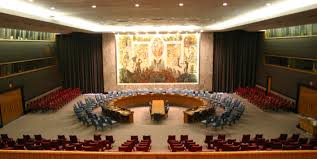The Hague, New York, 30 June 2015 – On 29 June 2015, the Prosecutor of the International Criminal Court (ICC) delivered her twenty-first report on the situation in Darfur, Sudan to the United Nations Security Council (UNSC). FIDH and ACJPS urge the UN Security Council, which referred the situation in Darfur to the ICC in 2005, and all States to fully cooperate with the Court and arrest those wanted by the ICC, including Sudanese President Omar al Bashir.“It is time to move beyond expressing statements of concern regarding the situation in Sudan and to take concrete steps to execute all arrest warrants against President al Bashir and other suspects before the ICC. The victims and survivors of the Darfur conflict deserve justice,” declared our organisations.There are currently five outstanding arrest warrants in connecting with the Darfur investigation, and three Government of Sudan indictees continue to hold public office.
In her report to the UNSC, Bensouda underscored that the investigation remains open in Darfur, despite major challenges and setbacks. She detailed ongoing widespread sexual violence, as well as attacks on the general civilian population, human rights defenders, humanitarian workers and peacekeepers. Since January 2015, over 120,000 people have been displaced in Darfur. Further, since the referral of the Darfur case to the ICC, conflict has spread to Blue Nile and South Kordofan.
Bensouda’s report comes in the wake of the recent visit of President Omar Al Bashir to South Africa, a state party to the ICC. Bashir visited South Africa to attend the African Union Summit despite two outstanding arrest warrants issued against him by the ICC for crimes against humanity and war crimes in 2009 and genocide in 2010. He arrived at the Summit on 13 June. Upon Mr. Bashir’s arrival to South Africa, the Pre-Trial Chamber of the ICC issued a decision stating in no uncertain terms that South Africa was under the obligation to immediately arrest and surrender Al Bashir. The Southern Africa Litigation Centre (SALC) immediately took legal action to compel South African authorities to comply with their international obligations and implement the arrest warrant against Al Bashir domestically. Bashir hastily departed South Africa on 15 June, despite the issuance of an interim order from the High Court in Pretoria compelling the authorities to prevent him from leaving the country. The High Court subsequently ruled that the Government of South Africa’s actions were inconsistent with the Constitution of the Republic of South Africa.
“South Africa’s lack of action—indeed, it’s wilful non-compliance—is a shameful blemish on its reputation as a nation committed to the rule of law,” declared our organisations. “The many thousands of victims of the conflict in Darfur await justice, and such actions do nothing but stand in the way of accountability for some of the most serious crimes committed in recent memory. It is the obligation of all States Parties, and the UN SC itself, to see that these cries for justice do not go unheeded.”
Echoing Bensouda’s remarks to the UNSC in her 20th report that “without stronger and committed action by the Security Council and States Parties, the situation in Sudan is unlikely to improve and the alleged perpetrators of serious crimes against the civilian population will not be brought to justice”, our organisations call on the UNSC and state party members to the Rome Statute to recalibrate their support to the ICC and efforts to implement the outstanding five arrest warrants.
Context
The UN Security Council (UNSC) first referred the situation in Darfur to the ICC on 31 March 2005.However ten years on, the four main suspects in the investigation, including Sudanese President Omar Al Bashir, remain at large in Sudan despite outstanding warrants of arrest.The Pre-Trial Chamber has referred Sudan’s and other States Parties’ non-cooperation in the arrest of the four fugitives to the UNSC on nine occasions, On 26 June the Pre-Trial Chamber issued a non-cooperation referral for Sudan to the UNSC, finding that Sudan had failed to arrest former Defense Minister Abdel Raheem Muhammed Hussein, who was first indicted for war crimes and crimes against humanity in 2012. Hussein became Governer of Khartoum in early June 2015.
Since the referral of the Darfur case to the ICC in 2005, conflict has spread to Blue Nile and South Kordofan. ICC indictee Ahmed Haroun is the current governor of South Kordofan. As of March 2015, there are approximately 1.7 million internally displaced people in South Kordofan and Blue Nile, roughly half the population. The conflicts have been characterized by mass violations of humanitarian and human rights law, including ground attacks accompanied by aerial bombardment.
– END –
Press Contacts:
Arthur Manet (French, English, Spanish), Email: press@fidh.org, Tel: +33 6 72 28 42 94 (Paris)
Lucie Kroening (French, English, German, Arabic), Email: press@fidh.org, Tel: +33 6 48 05 91 57 (Paris)
 African Centre for Justice and Peace Studies ACJPS | المركز الافريقي لدراسات العدالة و السلام
African Centre for Justice and Peace Studies ACJPS | المركز الافريقي لدراسات العدالة و السلام




